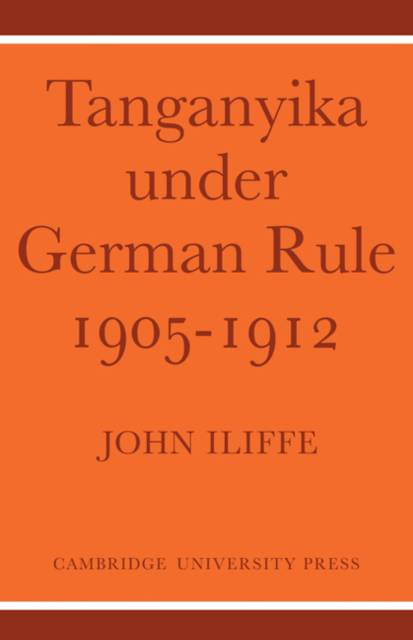
Je cadeautjes zeker op tijd in huis hebben voor de feestdagen? Kom langs in onze winkels en vind het perfecte geschenk!
- Afhalen na 1 uur in een winkel met voorraad
- Gratis thuislevering in België vanaf € 30
- Ruim aanbod met 7 miljoen producten
Je cadeautjes zeker op tijd in huis hebben voor de feestdagen? Kom langs in onze winkels en vind het perfecte geschenk!
- Afhalen na 1 uur in een winkel met voorraad
- Gratis thuislevering in België vanaf € 30
- Ruim aanbod met 7 miljoen producten
Zoeken
Omschrijving
The history of Tanganyika from the Maji Maji rebellion of 1905 (the greatest African rebellion against early European rule) to the last years of German administration. It examines a colonial situation in depth, ranging from the processes of change in African societies to the decisions of policy-makers in Berlin. In the aftermath of rebellion an imaginative Governor, Freiherr von rechenberg, initiated a programme of African cash-crop agriculture. This programme was reversed by a settler community which successfully manipulated the German political system. Meanwhile, after their defeat in armed rebellion, Africans sought power through educational and economic advancement. Tanganyika in 1912 was poised for that struggle for control between European settler and educated African which has been a fundamental theme of the modern history of East and Central Africa. Dr Illiffe's book is one of the few available studies of German colonial administration. He has drawn on a wide range of sources, both in East Africa and Germany. Written in the light of current reappraisal of African history, the book gives valuable insight into African initiatives during the early years of European rule.
Specificaties
Betrokkenen
- Auteur(s):
- Uitgeverij:
Inhoud
- Aantal bladzijden:
- 256
- Taal:
- Engels
Eigenschappen
- Productcode (EAN):
- 9780521100526
- Verschijningsdatum:
- 29/01/2009
- Uitvoering:
- Paperback
- Formaat:
- Trade paperback (VS)
- Afmetingen:
- 140 mm x 216 mm
- Gewicht:
- 326 g

Alleen bij Standaard Boekhandel
+ 129 punten op je klantenkaart van Standaard Boekhandel
Beoordelingen
We publiceren alleen reviews die voldoen aan de voorwaarden voor reviews. Bekijk onze voorwaarden voor reviews.









